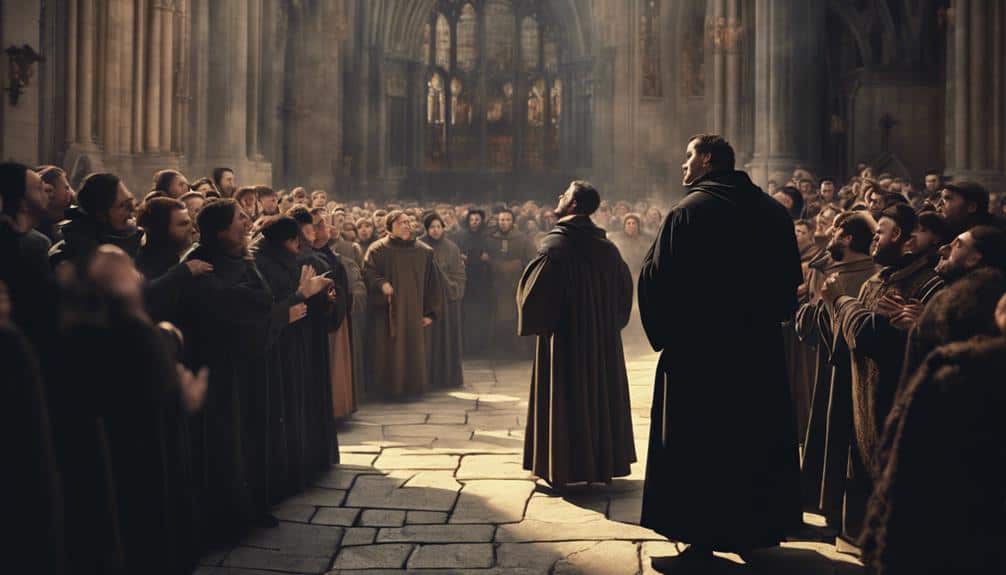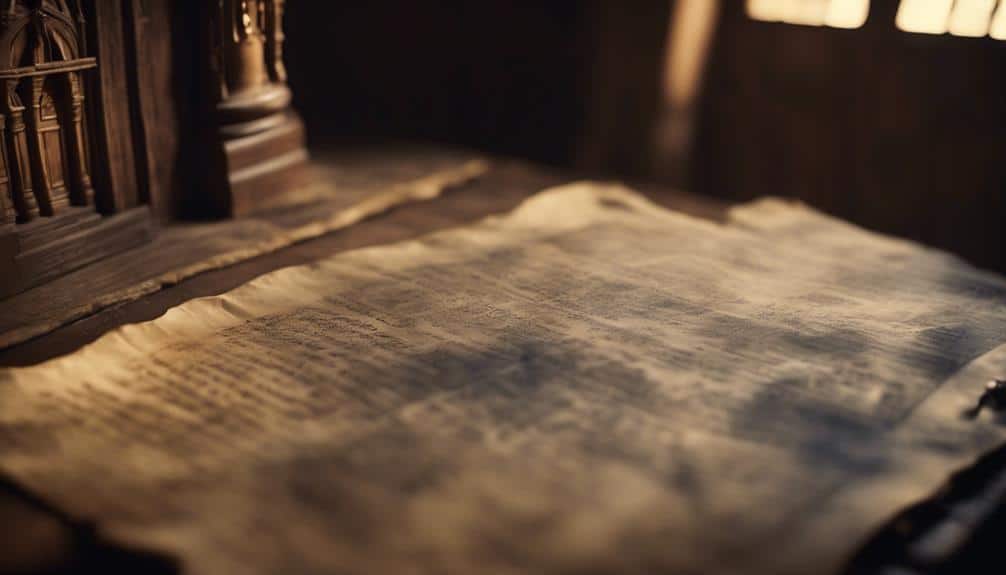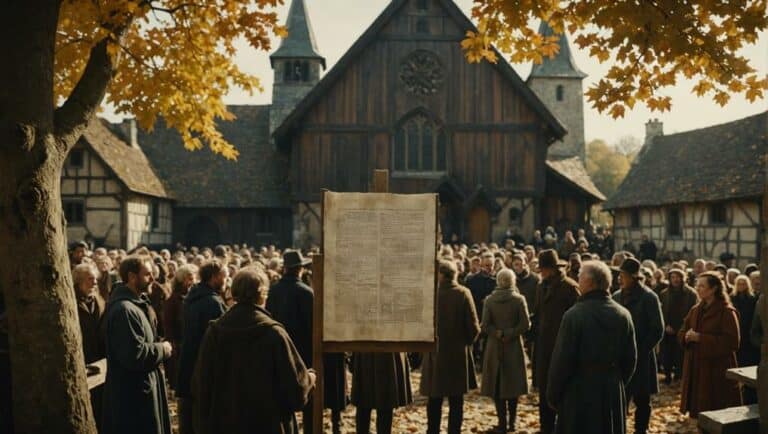In 1517, Martin Luther's bold act of nailing his Ninety-Five Theses to the Wittenberg church door ignited the Protestant Reformation, challenging the Catholic Church's authority and reshaping Europe's religious landscape.
Discover how this pivotal moment sparked widespread religious and political upheaval, forever altering Western civilization.
Martin Luther's Early Life
Born in 1483 in Eisleben, Saxony, Martin Luther's early life was marked by a rigorous education and a profound personal transformation that would later drive his critique of the Catholic Church. Luther began his formal education at the age of five, demonstrating early on a capacity for learning. By thirteen, he attended school in Magdeburg, where he was exposed to the teachings of the Roman Catholic Church. This foundational education was critical, as it set the stage for his future theological pursuits.
In 1505, a life-altering storm led Luther to enter a monastery, seeking solace and direction in monastic life. This decision was pivotal, as it immersed him deeply in the religious practices and doctrines of the Church. His commitment to his new path saw him advance his studies at universities in Erfurt and later Wittenberg, where he earned a doctorate in 1512. His academic achievements enabled him to become a professor, a role in which he further explored and questioned the tenets of the Catholic Church.
As a scholar and professor, Luther's immersion in both education and the monastic life provided him with a unique perspective that would later fuel his revolutionary ideas.
The Spark: Ninety-Five Theses

After years of theological study and growing discontent with the Church's practices, Martin Luther took a decisive step in 1517 by penning his Ninety-Five Theses, a document that would ignite the Protestant Reformation. Luther's frustration with the Catholic Church's practice of selling indulgences is evident, as he believed it corrupted the true path to salvation.
His theses emphasized salvation through faith alone, rather than through deeds or financial contributions. Luther boldly nailed his Ninety-Five Theses to the church door in Wittenberg, sparking widespread debate. His criticisms quickly spread across Europe, challenging the authority of the Church and questioning the legitimacy of indulgences.
The document's impact was profound, as it questioned whether the Church had the right to absolve sins in exchange for money. Luther's call for reform reached a climax when he was summoned to the Diet of Worms, where he was asked to recant his views. His refusal marked a pivotal moment in the Protestant Reformation.
Through his Ninety-Five Theses, Luther not only critiqued the Catholic Church but also reshaped the understanding of faith and salvation, setting the stage for a significant religious transformation.
Clash With the Catholic Church

As Martin Luther's Ninety-Five Theses spread across Europe, the Catholic Church vehemently reacted to his radical challenge, leading to a fierce and consequential clash. Luther's theses directly attacked the Church's lucrative practice of selling indulgences, which promised remission of sins in exchange for money. By questioning this practice, Luther also challenged the authority of the Pope, arguing that salvation came through faith alone, not through the Church's intercessions or financial transactions.
The Catholic Church didn't take this lightly. Luther was promptly labeled a heretic, a severe accusation that threatened his life and freedom. His writings and teachings were condemned, and he was excommunicated in 1521. The Church sought to silence Luther and suppress his ideas, but the Ninety-Five Theses had already ignited a firestorm of debate.
This clash wasn't just about indulgences; it was about the foundational authority of the Church and the nature of faith itself. Luther's defiance spurred the Protestant Reformation, leading many to question established religious beliefs and practices. The ensuing conflict marked a significant shift, challenging the Church's dominance and reshaping the religious landscape of Europe.
Impact on the Reformation

Luther's Ninety-Five Theses not only ignited the Protestant Reformation but also fundamentally altered the religious, social, and political fabric of Europe. By challenging the Catholic Church's practice of selling indulgences, Luther catalyzed widespread rejection of papal authority. His critique resonated deeply, leading to a rapid dissemination of his ideas across Europe.
As a result, the Catholic Church faced unprecedented scrutiny. Luther's excommunication by Pope Leo X and his subsequent condemnation as an outlaw and heretic at the Diet of Worms only solidified his break from the Church. This confrontation underscored the profound impact of his actions, compelling other reformers to question ecclesiastical authority and advocate for change.
The Protestant Reformation spurred significant religious transformations, diminishing the Catholic Church's hegemony and fostering diverse Christian denominations. Socially, it empowered individuals to seek personal connections with faith, bypassing traditional clerical intermediaries. Politically, the Reformation weakened unified Christendom, leading to the rise of nation-states and shifting power dynamics within Western civilization.
In essence, Luther's Ninety-Five Theses marked a pivotal moment in history. It not only challenged the status quo but also set in motion a series of events that reshaped the very foundation of European society.
Lasting Legacy and Controversies

The lasting legacy of Martin Luther's Ninety-Five Theses lies in its profound redefinition of religious authority and its enduring impact on Christian doctrine and practice. By asserting that salvation comes through faith alone and emphasizing the authority of the Bible, Luther fundamentally challenged the Catholic Church's practices. This led to his excommunication and condemnation at the Diet of Worms in 1521.
Luther's translation of the Bible into German democratized access to scripture, undermining the Church's control over religious knowledge. This act alone shifted the locus of spiritual authority from the clergy to the individual believer, fostering a more personal faith experience.
The establishment of the Lutheran Church in Wittenberg in 1526 was a pivotal outcome of Luther's actions. It institutionalized the theological principles he advocated, and set the stage for the broader Protestant Reformation. This movement not only redefined Christian practice but also had far-reaching social and political implications, reshaping Western civilization.
Controversies surrounding Luther's legacy persist. Some view his actions as a necessary correction to ecclesiastical abuses, while others see them as a divisive force that splintered Christendom. Regardless, Luther's influence on religious thought and practice remains undeniably profound.


